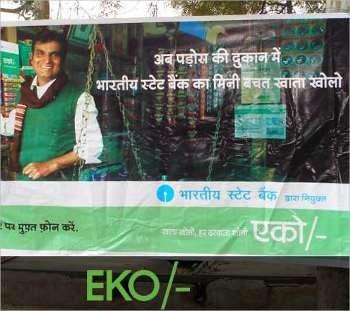
Eko, a low-cost mobile banking solution for low-income people, has set up a network of 1,300 intermediaries to help the poor access financial services. These small stores act as banks for low income population who are able to use their phones to store and send money. Starting in Bihar, Jharkhand and Delhi (with plans to expand to UP and Maharastra) this SMS based platform has the potential to scale if awareness of the service grows.
Customers just have to approach local retail stores that are sub-agents of Eko with their identity proof, a photograph, and a personal mobile phone number.
Eko is a low cost mobile banking solution for people in the low income groups. It is just the right service for India, where the workforce is 540 million-strong. Only about six per cent of these workers are employed in the organized sectors. The low cost mobile banking company Eko aims to serve the unorganized segments of our economy.
Eko was founded in 2009 with the aim to reduce the cost of financial transactions. The reason? The bigger banks used to target only higher income group customers due to more earnings from them. Eko decided to reach out to low income group customers through mobile phones to deliver banking services to them.
Almost at the same time a regulation was made by the Reserve Bank of India, which said non-profit companies could only become business correspondents for regular banks, and that retail outlets such as grocery stores and petrol pumps could work as sub-agents of these business correspondents (BCs). These regulations allow SBI and Eko to work together to allow customers to open zero-balance accounts. Customers can save money in these zero-balance bank accounts and earn an interest rate of 2 to 3 per cent per annum on their savings.— all the banking activities such as deposit, withdrawals, remittance and checking balance can be done through SMS.
Low income group customers just have to approach local retail stores that are sub-agents of Eko with their identity proof, a photograph and of course, a personal mobile phone. Eko has managed to reach its target audience easily by collaborating with local retail stores, which are in direct touch with the customers.
Mugdha Bhargava, vice president of communication, Eko, said, “We plan to cover Bihar, Jharkhand and Delhi for the next six months and then move to other parts like UP and Maharashtra.” She said there was no referral system in place right now and that the company targeted the customers through various activities like nukkad natak, promoter-led and van activities, financial literacy comics etc. The company had plans to associate with banks other than SBI and ICICI Bank, but details were not given.
According to another official from the company, Eko is currently present in Delhi NCR region and Bihar-Jharkhand region, which are full of migrant workers. Eko currently engages about 1,300 CSPs (customer service points) or retail outlets to serve customers. These retail outlets are chosen on the basis of certain risk parameters like criminal record, identity proof, shop address proof, and business details like footfall, cash management capabilities, goodwill in the market etc.
These retail stores work like mini bankers for low income group customers who otherwise have no access to banking services. The transactions are kept secure with the help of unique and secret PIN numbers.
Eko has also entered into a partnership with VeriSign to make sure that transactions are kept secure. The details of the transactions conducted are also sent to the customer in the form of an SMS.
http://www.themobileindian.com/news/1653_Eko:-The-mobile-bank-for-low-income-customers
